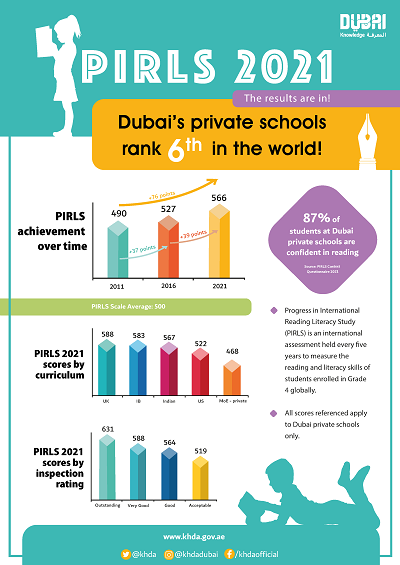 Dubai – May 18, 2023:
Dubai – May 18, 2023: Dubai private schools have increased their score by 76 points since 2011 to place sixth in the world in the most recent cycle of the Progress in International Reading Literacy Study (PIRLS) assessment.
PIRLS is an international assessment held every five years to measure the reading and literacy skills of students enrolled in Grade 4 globally.
Private schools in Dubai scored 566 points in the 2021 study, significantly higher than the global average of 500 points. This is the first time Dubai’s private schools have featured in the top 10 of the global league table.
Dr Abdulla Al Karam, Director General of KHDA said: “Congratulations to the school leaders, teachers, parents and students at all participating schools on this great accomplishment. These results are significant not just because they exemplify the world-class teaching and learning happening across our schools every day. They are also an acknowledgement of how our school community worked together to overcome the restrictions in place at the time PIRLS was conducted. Achievements such as this provide further affirmation that education in Dubai can take its place among the best in the world.”
Schools rated Outstanding scored 631 points – nearly 150 more than the global average, while Very Good and Good schools scored 588 points and 564 points respectively.
UK curriculum schools performed best in the PIRLS assessment, scoring 588 points, followed by IB curriculum schools with 583 points.
Fatma Belrehif, CEO of Dubai Schools Inspection Bureau commented: “The results from the latest PIRLS assessments reflect the performance of the school inspections, with Outstanding and Very Good schools outperforming global averages. We are proud of our school community’s dedicated approach to supporting students through the pandemic and continuing to offer high-quality education during challenging times.”
Twenty-seven per cent of students in Dubai private schools achieved the Advanced International Benchmark of 625 points, compared to 12 per cent in 2016.